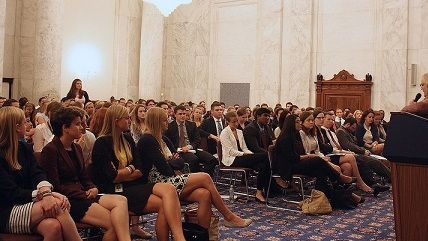The Double Standard on Low-Wage Work
Democrats love unpaid interns. Republicans more likely to pay them.

Tim Kaine, Virginia's junior senator and perhaps Hillary Clinton's running mate, has expressed his disappointment over Washington's failure to raise the minimum wage. Last year he sponsored legislation to raise the federal minimum to $12 an hour. Bobby Scott, Virginia's 3rd District representative, supports the idea. Virginia Rep. Gerry Connolly, another Democrat, also wants to raise the wage. So does Virginia's third Democratic congressman, Don Beyer—and so does President Obama.
And that's no surprise; it's a rare Democrat who doesn't want to raise the wage. Republicans aren't on board, though, so legislation to do so has languished in purgatory.
But Democrats don't have to wait for Republican assent to strike a blow on behalf of the working stiff. They could start right now—by encouraging their colleagues to stop exploiting cheap labor in their very own offices.
That cheap labor is provided by interns, usually of college age. Most of those interns do not work for the minimum wage. In fact, they don't work for any wage at all. They are unpaid.
As The New York Times recently reported, congressional offices "hire thousands of interns each year" but "pay very few of them." What's more, "the White House does not pay a single intern out of almost 100." Still more unpaid interns "come to work for local nonprofits." The interns either work second jobs to pay their bills or come from rich families that can support them.
Despite his support for higher wages, Beyer doesn't pay his interns. Neither does Connolly. Nor does Nancy Pelosi, another supporter of higher minimum wages. The same goes for Harry Reid. Not even the Democratic Congressional Campaign Committee pays its interns. Kaine and Scott both pay some of their interns, but not those who are getting course credit for the work. (Bernie Sanders, to his credit, pays interns $12 an hour, with evidently no exceptions.)
This is, to say the least, incongruous.
After all, it's an article of Democratic faith that raising the minimum wage is not just a nice idea but a moral imperative—indeed, nothing less than a matter of economic justice. Therefore, to pay workers a measly $7.25 an hour—rather than $10.10 an hour, or $12 an hour, or $15 an hour—is simply wrong.
But if it is morally wrong to pay workers only $7.25 an hour, how can it be right to pay some of them $0.00 an hour?
Well, there are reasons. Or excuses, depending on how you look at it. As Connolly's website notes, "an internship provides an excellent opportunity to gain valuable experience." Besides, "internships are available expressly for the purpose of furthering educational objectives, therefore they are unpaid." Beyer's office makes a similar point: "Although all internships in all offices are unpaid, interns gain invaluable work experience."
And that makes a certain amount of sense. In fact, it makes so much sense that corporate America routinely calls attention to the same point when it argues against the government mandating high wages for entry-level and other low-skilled workers: Those employees are learning valuable job skills that will help them climb the ladder of success. The non-monetary compensation therefore makes up for the low pay.
But Democrats don't accept that argument when it comes from the private sector. So why do they use it themselves?
Congressional Democrats also tend to be keen on the concept of equal pay. Earlier this year the president and Democratic leaders gathered at a museum Obama was dedicating as the Women's Equality National Monument. "If we truly value fairness then America should be a level playing field," the president said. Equal pay for equal work is a fine principle. So why not practice it? How can Obama and other Democrats justify two different pay scales—one for the category of workers known as "employees" and one for the category known as "interns"? Especially when some of those interns are college graduates?
One of the reasons Donald Trump has attracted so much support is the sense that, as he puts it, the system is rigged: There is one set of rules for the nation's elite and another set for everybody else. So it's worth noting that the Fair Labor Standards Act does allow private employers to use unpaid interns in rare cases, under very strict criteria. Congress, however, applies a different, laxer version of the law to itself, which explicitly excludes interns from employees covered by the statute.
If the preceding isn't enough to convince Democrats, there's one more fact that might shame them into doing so. When The Atlantic looked at the issue a couple of years ago, it noted that only a third of U.S. senators pay their interns—and "most of them are Republicans."
Of course, Republicans generally don't try to force companies to pay workers more. Democrats who aren't willing to pay decent wages themselves have no business trying to, either.
This column originally appeared at the Richmond Times-Dispatch.


Show Comments (187)